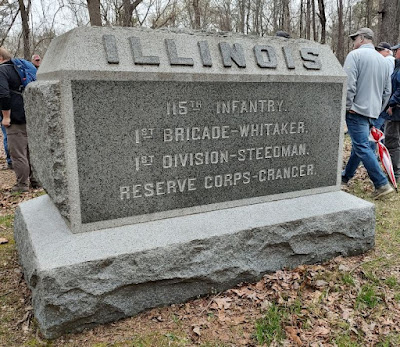Saving the Army: The 115th Illinois on Horseshoe Ridge
The arrival of General James Steedman's division atop Horseshoe Ridge on the afternoon of Sunday, September 20, 1863, in General Thomas' estimation, saved the Union army at Chickamauga. Few of the troops of the Reserve Corps had seen much combat, among them the subject of today's post the 115th Illinois Volunteer Infantry.
Raised in September 1862 from several counties in the center of the state, the regiment spent it first months in the service on rear area duty in Kentucky before joining the main army in February 1863. It saw its first action at Franklin on April 10, 1863, then participated in the Tullahoma campaign.
The Reserve Corps held open the vital road at Rossville on the first day of the battle before moving to the front the following day. As remembered by Frank Gates of Co. K, the regiment double quicked to the front and came under fire as soon as they arrived on the ridge. "The ball opened in dead earnest, the bullets from our own and the enemy’s guns scaling and barking the trees and tearing up the earth and gravel around us at a fearful rate," he remembered.
Sergeant Gates' account of Chickamauga first saw publication in the April 14, 1887 edition of the National Tribune.
I was there on
that memorable Sunday afternoon and can bear testimony so far as the outlines
of the contest are concerned. The command to which we belonged (Granger’s
Reserve Corps) was on the extreme left of our lines on Saturday and was no
brought into the main battle on that day, although a severe skirmish took place
in the afternoon which gave us a foretaste of the coming crisis.
We lay on our
arms all night near the Ringgold road. Next morning, we were up betimes and
ready for business awaiting the coming of the enemy; but he did not make his
appearance. A hasty breakfast was prepared and eaten and soon after our command
commenced moving to the right or toward the main battlefield. The roar of the
cannon and rattle of small arms were by this time fairly under way. We came
nearer and nearer to where the contest was raging and suddenly, to our surprise,
we came under the range of a Rebel battery, the shells which played through and
about our line much to our discomfort. A few men of our regiment were wounded
by the bursting missile, a captain mortally. We were soon double quicked out of
range and reported shortly after to General Thomas who assigned us to a part of
the line through an open timber and along the brow of a ridge over which our
line advanced in battle order some 15-20 rods. The ball opened in dead earnest,
the bullets from our own and the enemy’s guns scaling and barking the trees and
tearing up the earth and gravel around us at a fearful rate.
 |
| Frank W. Gates Co. K, 115th Illinois Infantry |
This havoc and
destruction lasted a short time only when we fell back to the top and a little
way over the crest of the ridge. A lull in the contest gave us a short rest.
Sergeant Aylesworth of our company, as brave a soldier as every lived, and who
and hour later gave his life for his country, came to me and suggested that we
go down to the front and bring up Lieutenant Bailey who fell wounded at the
first fire. We went but did not find the lieutenant, he having been brought
back by others. We captured two of the enemy who were secreted where a large
tree had been upturned, forming a hole in the ground. One of them belonged to a
Mississippi and the other to a Texas regiment.
We had not
more than got back to the regiment when another charge of the enemy more
powerful than the first had to be resisted. In this we suffered the heaviest
loss but held our ground. Comrade after comrade went down. Their looks and
death struggles made an imprint on my mind that time can never efface. A third
and fourth charge were resisted. In rallying the lines for the last stand
General James B. Steedman displayed the most splendid bravery, riding up and
down the lines telling the boys in the most positive terms that the position
must be held at all hazards, even at the point of the bayonet.
Just at this moment and to our delight two 12-pdr brass cannon were brought up, unlimbered, and wheeled into position on our part of the line. They had not more than got their places when the yells of the enemy were again heard and in less than two seconds, they were swarming over the brow of the ridge like so many demons intent on their prey. Lines of blaze and liquid fire darted up in their front. The cannon pealed forth in thunder tones, double-shotted with canister, at short range. Then their yelling ceased and they fell back in confusion. The gap or outlet for Thomas’ army was held, and it passed toward Rossville and Chattanooga. We brought up the rear with a feeling that we had faithfully done our duty.
Source:
“Chickamauga: The Important Services of the Reserve Corps on
the Second Day,” Orderly Sergeant Frank W. Gates, Co. K, 115th
Illinois Volunteer Infantry, National Tribune, April 14, 1887, pg. 3











Comments
Post a Comment